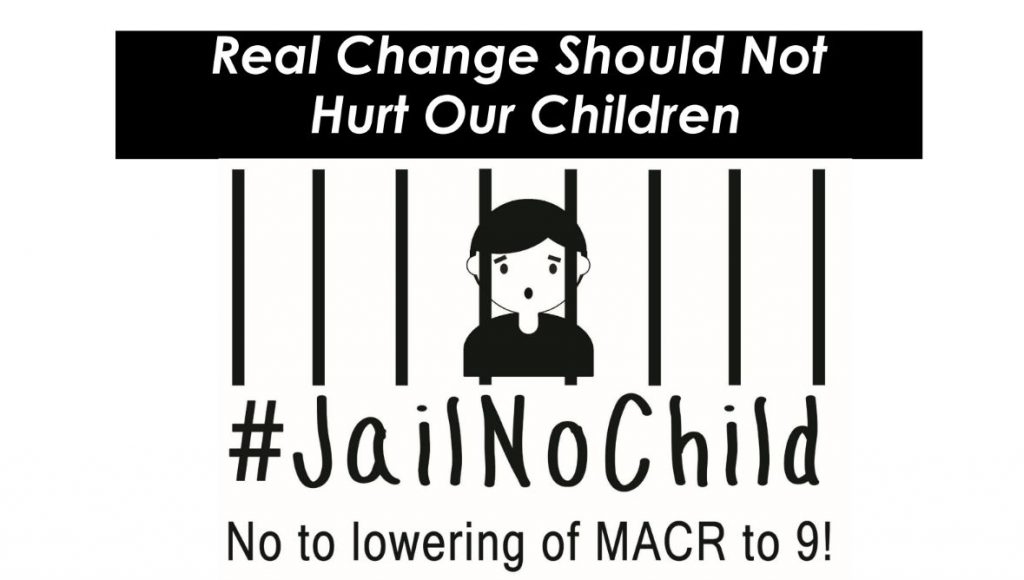#ChildrenNotCriminals: Children need saving. Jail is no place for a child.
Oppose the move in the Congress to lower minimum age of criminal responsibility (LMACR) from the current 15 years old to 9.
A few years ago, I watched Bunso , a poignant documentary film by Filmmakers Ditsi Carolino and Nana Buxani about three boys Tony, 13, Diosel and Bunso, 11 struggling to survive in a crowded Cebu jail alongside adult rapists and murderers. The two streetsmart boys paint us a picture into the surreal world of children caught between extreme poverty and the law.
These boys talked about their hunger and how they resorted to stealing just to survive. One boy stole from a sari-sari store because he could not bear the hunger pangs any longer. The owner did not press charges but the father wanted to teach his son a lesson by sending him to jail.
The boys are in prison for petty theft and robbery. Anthony claimed that he stole huge amounts of money to feed his family when his mother neglected his siblings. Bunso was on the streets because his mother did not “send him to school or care for him”. He resorted to begging for money at first, but when he couldn’t get any money, he stole. Then he started sniffing glue and needed more money to fund his addiction.
“I’d sniff first then eat,” he said in the film.
As I watched the boys talk of their jail experience, I wanted to hug them and say that it is alright. You are just kids. You deserve a second chance.
In May 16, 2006, the President signed into law, Juvenile Justice and Welfare Act of 2006. Republic Act 9344 or the Juvenile Justice Welfare Act (JJWA), is a significant legal safeguard for the dignity of the Filipino child. With this law, youth offenders–most of whom are from disadvantaged socioeconomic sectors–will not be submitted to the dehumanizing conditions in correctional institutions. JJWA likewise provides measures and initiatives to ensure that children in conflict with the law will be rehabilitated, and eventually be reintegrated to the society as contributing members.
But this 17th Congress, the protection for the Filipino child provided by JJWA, is in danger. Attempts to bring back the minimum age of criminal responsibility to nine is happening now with six bills , supportive of this measure being filed in the House of Representatives. The bills have already been heard by the sub-committee on Correctional Reforms and are expected to pass soon, with an overwhelming likelihood of getting the same result in its mother committee, the Committee on Justice.
Child rights advocates like the Child Rights Network (CRN) are opposing the moves to lower the minimum age of criminal responsibility (LMACR). Lowering the minimum age of criminal responsibility will not work to the best interests of children in conflict with the law and would deter their rights to survival and development.
There have been studies that criminalizing children leads to recidivism. Detention of children have also been linked to adverse effects on a child’s mental, physical and emotional development, as they are likely to be subjected to discrimination and abuse while detained. What happens is jailing children will deny them of opportunities for advancement through education, and future employment. Proposals to lower the minimum age of criminal responsibility also ignore scientific evidence that a child’s brain is structurally and functionally immature, which influences their decision-making and increases their tendency to engage in risky behaviors during adolescence.
There are sufficient measures to hold children accountable for their offenses, while respecting their developmental capacities. There is strong evidence that these measures are effective in restoring and reintegrating children to the community, as documented by child rights advocates. Focus should be on replicating these positive results to make the law succeed for all children, not amending the said law, and in the process, compromising the welfare of Children in conflict with the law.
With the “correct implementation—rather than amendment, suspension or repeal—of the Juvenile Justice and Welfare Act of 2006, coupled with proper education about the law and necessary budget allocation, should be prioritized by the government.”
How can we help children have a second chance in life when the government does not even give priority to the intervention program that could help them reform?
A jail is no place for a child. We should not allow retrogressive bills such as this to reverse the advances in child protection in the Philippines and put children to jail. Instead, we should support efforts to strengthen and enhance the implementation of Juvenile Justice and Welfare Act.
Join the campaign to oppose moves in the Congress to lower minimum age of criminal responsibility from the current 15 years old to 9.

